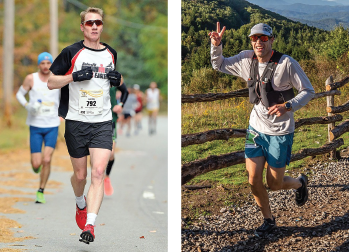
Left: Matt Miller, MD, competes at the Baystate Marathon and Half Marathon in 2019. Right: Jim Daniero, MD, competes in the 2020 Grayson Highlands 50k ultramarathon.
© Courtesy Jim Daniero, MD and Matthew Q. Miller, MD
Matthew “Matt” Q. Miller, MD, should have died on the Blue Ridge Parkway along the Blue Ridge Mountains in Charlottesville, Va. Instead, the Ironman triathlete, otolaryngologist, husband, and father of two is about to become an assistant professor in otolaryngology–head and neck surgery at the University of North Carolina, Chapel Hill this July.
Explore This Issue
May 2021He has come a long way—symbolically, if not geographically—since then.
In 2008, Dr. Miller, then 20 and a college junior, along with two friends from the University of Virginia’s triathlon club, were on an 85-mile bike ride. Dr. Miller lost control of his bike and collided head on with a car traveling 40 miles per hour in the opposite direction. The accident knocked him into the air, and he fell to the pavement, sustaining a traumatic brain injury and panfacial fractures.
Thankfully, an anesthesiologist was in the car behind the one Miller hit; that physician was able to revive Dr. Miller’s breathing and keep him alive until a medical helicopter transported him to the University of Virginia Medical Center. There, Dr. Miller faced a long and, at times, unknown recovery, with the left side of his face completely paralyzed for months. “After the accident, I was told the police shut down the road to perform an investigation in case I became a fatality,” he said.
Ultimately, Dr. Miller recovered. Nearly two years, to the day, after he left the hospital, he trained for, competed in, and finished the Cozumel Ironman triathlon competition in Mexico in 2010 during Thanksgiving break of his first year in medical school at the University of Pennsylvania. The former high school and college swimmer spent 10 to 15 hours a week for six months training to prepare for the 2.4-mile swim, 112-mile bike ride, and 26.2-mile run, wearing a sweatshirt as he ran on a treadmill to get his body used to competing in a warm climate. Ultimately, he finished the race in 10 hours and 30 minutes.
“I had made an unofficial goal for myself to complete an Ironman as a symbol of my recovery,” he said. That day, he said, his main goal was to “race smart and finish the race. I was very happy with my time and performance,” he said.